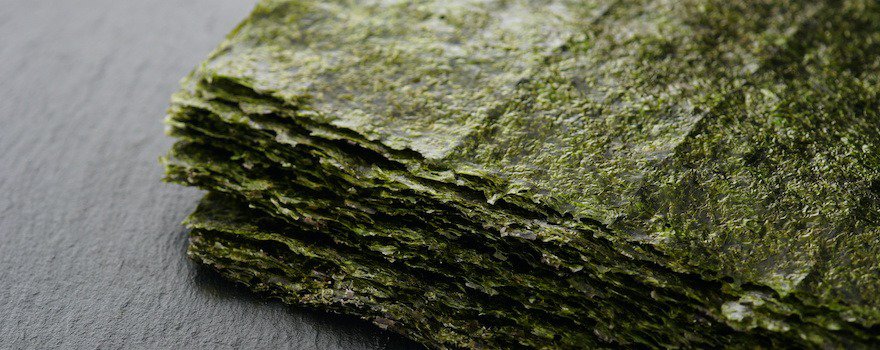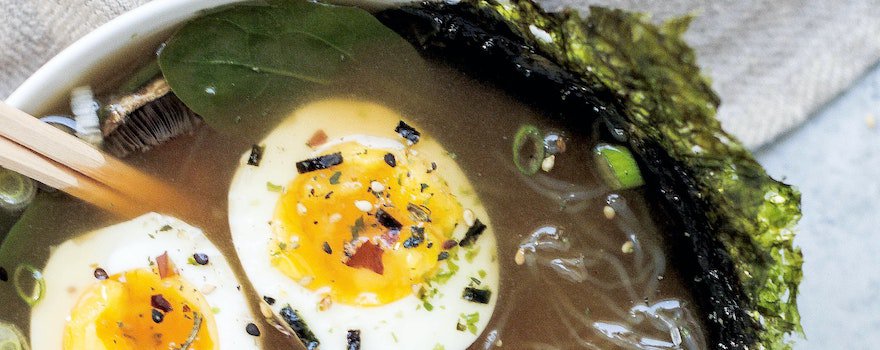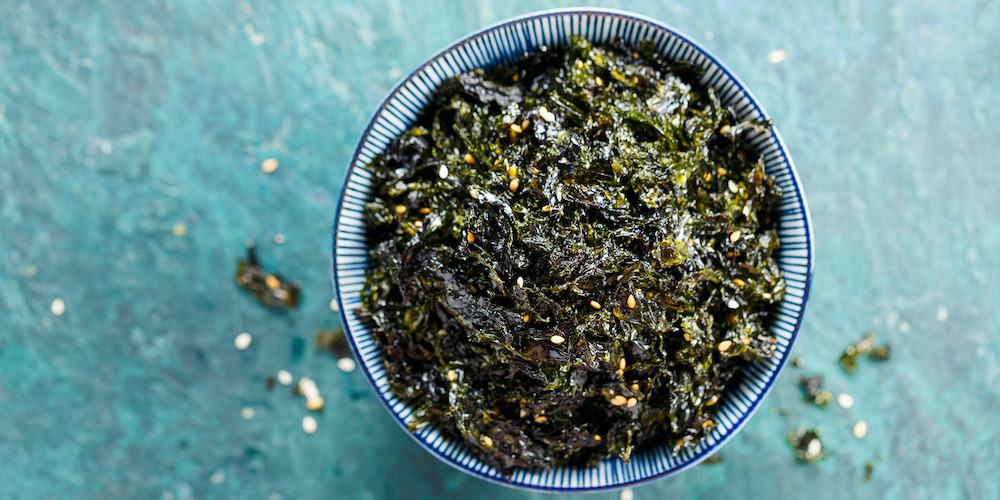BENEFITS OF NORI
✓ Source of plant-based proteins
✓ Source of antioxidants
✓ Stimulates the immune system
✓ Source of vitamin B12
✓ Potentially anti-cancer
What is nori?
Nori, which means « seaweed » in Japanese, includes different species of edible red seaweeds. These belong to the genus Porphyra and originate from Asia: China, Japan, Korea… Among the main cultivated varieties are Porphyra haitanensis, Porphyra tenera, and Porphyra yezoensis.
It grows in cold waters through photosynthesis. Depending on the variety, they can reach up to 60 cm in length.
Once harvested, they are eaten fresh or used as thin dried sheets. These sheets are known worldwide because they are used to make the famous Japanese sushi and maki.
It can also be found in powder or flakes for seasoning dishes.
Like the wakame, another Japanese seaweed, nori stands out for its excellent nutritional qualities. It is an excellent source of plant-based protein and, to a lesser extent, a source of bioavailable vitamin B12. Of interest to vegetarians, this seaweed is also antioxidant, immune-stimulating and potentially anti-cancer.
Nori is today one of the most consumed seaweeds in the world thanks to its presence in Japanese sushi and maki. In Japan, it is mainly cultivated in the Saga region, located on the shores of the Ariake Sea. Because it requires significant labor, its cultivation supports the livelihoods of many producers in the region.
Nutritional composition
- Acides aminés
- Vitamines : pro-vitamine A, B2, B3, B9, B12, C, E
- Minéraux et oligo-éléments : sodium, calcium, fer, zinc, phosphore, potassium, iode, manganèse, cuivre
- Protéines
- Glucides
- Fibres
- Acides gras : oméga 3
- Actifs antioxydants : composés phénoliques, polysaccharides

Benefits of nori
🌿 Source of plant-based proteins
The nori seaweed is among the best sources of plant proteins. Thus, 100 g of dried nori contains about 36 g of protein. These are quality proteins that contain many amino acids : glycine, alanine, valine, tyrosine, phenylalanine, arginine…
This high content is particularly beneficial for people who are vegetarian, plant-based, or vegan. This seaweed helps meet the recommended daily protein requirements and thus prevent deficiencies.
This review from Jiangsu University (China) details the nutritional composition of the different varieties of nori seaweed, notably their protein content.
🥝 Source of antioxidants
Nori seaweed contains many antioxidants, including phenolic compounds and polysaccharides. It notably contains fucoidan, a sulfated polysaccharide that traps free radicals and prevents them from becoming established in the body.
In addition, it contains antioxidant nutrients such as vitamin C and manganese, which protect cells against oxidative stress.
This study from Nagasaki University (Japan), conducted in the laboratory, investigated the antioxidant activity of porphyran, a polysaccharide extracted from nori.
🛡 Stimulates the immune system
Nori seaweed appears to have a beneficial effect on the immune system. Thus, its consumption stimulates macrophages (white blood cells), which form the first line of defense against infectious agents.
Moreover, the seaweed activates the NF-κB protein (nuclear factor-kappa B) involved in the immune response.
This study from the College of Medicine at Ulsan University (South Korea), conducted in mice, shows how nori activates the immune response.
👩🏻⚕️ Source of vitamin B12
Like klamath, it contains vitamin B12. But only dried nori contains bioavailable vitamin B12, meaning it is absorbable and can be used directly by the body. This seaweed is therefore of interest to vegetarians and vegans, who should still use supplementation to avoid deficiencies.
This study from Hagoromo-gakuen College (Japan), conducted on rats, shows the bioavailability of vitamin B12 in dried nori.
🔬 Potentially anti-cancer
Thanks to its richness in antioxidant polysaccharides, nori exerts an anti-cancer effect. Thus, it has been shown to be effective in slowing the growth of cancer cells. Furthermore, it induces apoptosis, that is, the programmed cell death of malignant cells. It therefore has strong potential for cancer prevention and treatment.
This study from Shantou University (China), conducted on human cells, shows the anti-cancer effects of nori.

How to consume nori?
Fresh nori seaweed
Fresh nori can be found at specialty stores, Asian grocery stores, or online. After harvest, they are simply preserved in salt. Before consuming them, it is therefore necessary to rinse them and remove the salt by soaking them in water for 10 minutes.
When cut into thin strips, fresh seaweed pairs perfectly with salads, vegetables, rice, pasta, soups, and miso soup. It has a mild, fragrant flavor, between hazelnut and mushroom.
The dried nori leaves
This is the easiest format to find. After harvest, nori is cut, then pressed and dried to produce thin sheets. Depending on the variety, the sheets take on a light green, dark green, or green-black color. Dark green is most often used to wrap maki, while black is the rarest and most expensive.
You can use dried sheets to prepare your own Japanese sushi and maki. Moisten them lightly before making your rolls. The sheets can also be toasted and are then called “Yaki Nori”. They add a bold flavor to ramen, soba noodles, omelets, sauces… They can even be enjoyed as-is as an appetizer or as a snack during the day.

Consume sustainably: favor organic, local, and fair-trade nori
✓ By itself, Japan produces about 400,000 tonnes of nori per year. Its cultivation extends to China, South Korea but also to Europe, such as Spain and France. It thrives particularly in the rocky areas of the Breton coasts where it grows wild. Harvested from November to April, the seaweed is then drained on racks.
✓ If you can, choose nori from France, wild and hand-harvested. If it comes from farming, prefer organic and/or fair-trade sources.
Dosage
It is recommended to consume 20 to 30 g of fresh seaweed per day. There is no real dosage for dried nori sheets. Just be careful not to eat them in excess.
Contraindications and side effects
Consumption of nori has some contraindications :
- Parce qu’il est naturellement salé, les personnes souffrant d’hypertension artérielle doivent en consommer avec modération
- Sa consommation est déconseillée aux personnes souffrant de troubles de la thyroïde, d’une insuffisance rénale ou d’une maladie cardiaque
- Les femmes enceintes ou allaitantes doivent demander conseil à leur médecin avant d’en consommer
Nori has very few side effects. Only excessive consumption can cause adverse effects on the kidneys, liver and thyroid.
If you experience side effects, stop consuming it and consult a doctor.
Report prepared by Julia Perez
Sources and scientific studies
Jin Cao, Jianping Wang, Shicheng Wang, Ximing Xu, 2016. Porphyra Species: A Mini-Review of Its Pharmacological and Nutritional Properties.
Shogo Isaka, Kichul Cho, Satoru Nakazono, Ryogo Abu, Mikinori Ueno, Daekyung Kim, Tatsuya Oda, 2015. Antioxidant and anti-inflammatory activities of porphyran isolated from discolored nori (Porphyra yezoensis).
Ji-Hye Song, Hee-Bum Kang, Seung-Ho Park, Ji-Hoon Jeong, Jeongjin Park, Yanghee You, Yoo-Hyun Lee, Jeongmin Lee, Eungpil Kim, Kyung-Chul Choi, Woojin Jun, 2017. Extracts of Porphyra tenera (Nori Seaweed) Activate the Immune Response in Mouse RAW264.7 Macrophages via NF-κB Signaling.
S Takenaka, S Sugiyama, S Ebara, E Miyamoto, K Abe, Y Tamura, F Watanabe, S Tsuyama, Y Nakano, 2001. Feeding dried purple laver (nori) to vitamin B12-deficient rats significantly improves vitamin B12 status.
Wan-Zi Yao, Suresh Veeraperumal, Hua-Mai Qiu, Xian-Qiang Chen, Kit-Leong Cheong, 2020. Anti-cancer effects of Porphyra haitanensis polysaccharides on human colon cancer cells via cell cycle arrest and apoptosis without causing adverse effects in vitro.
P. Baweja, I. Levine, 2016. Seaweed in Health and Disease Prevention.



